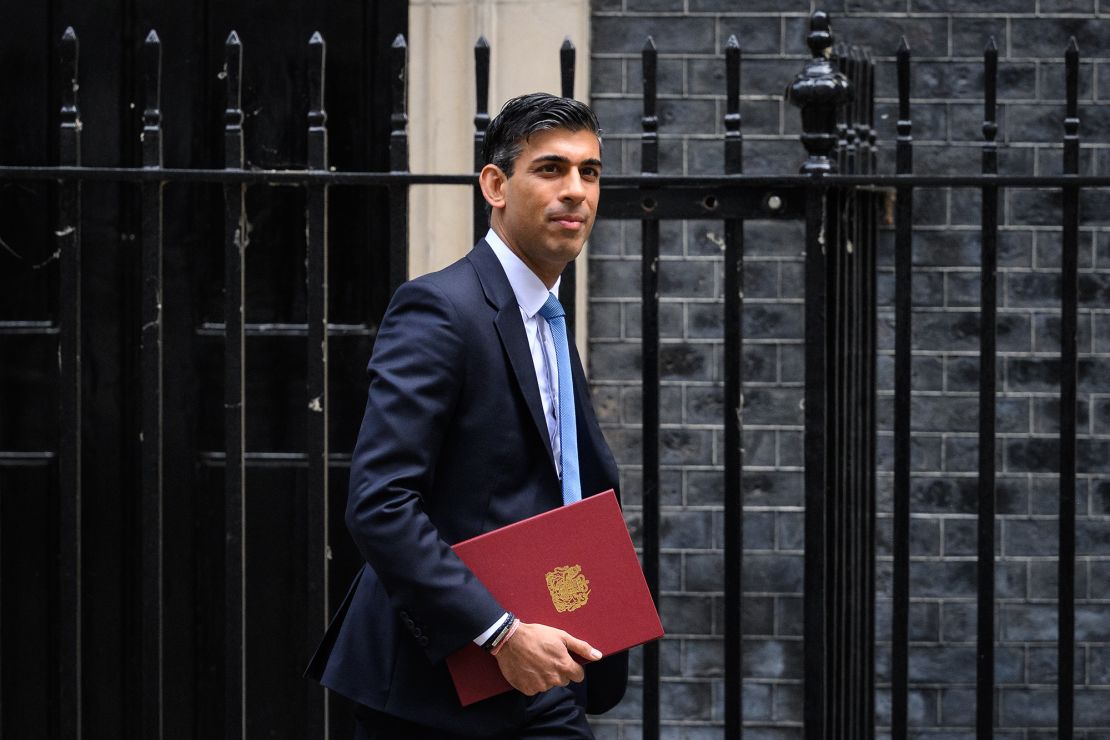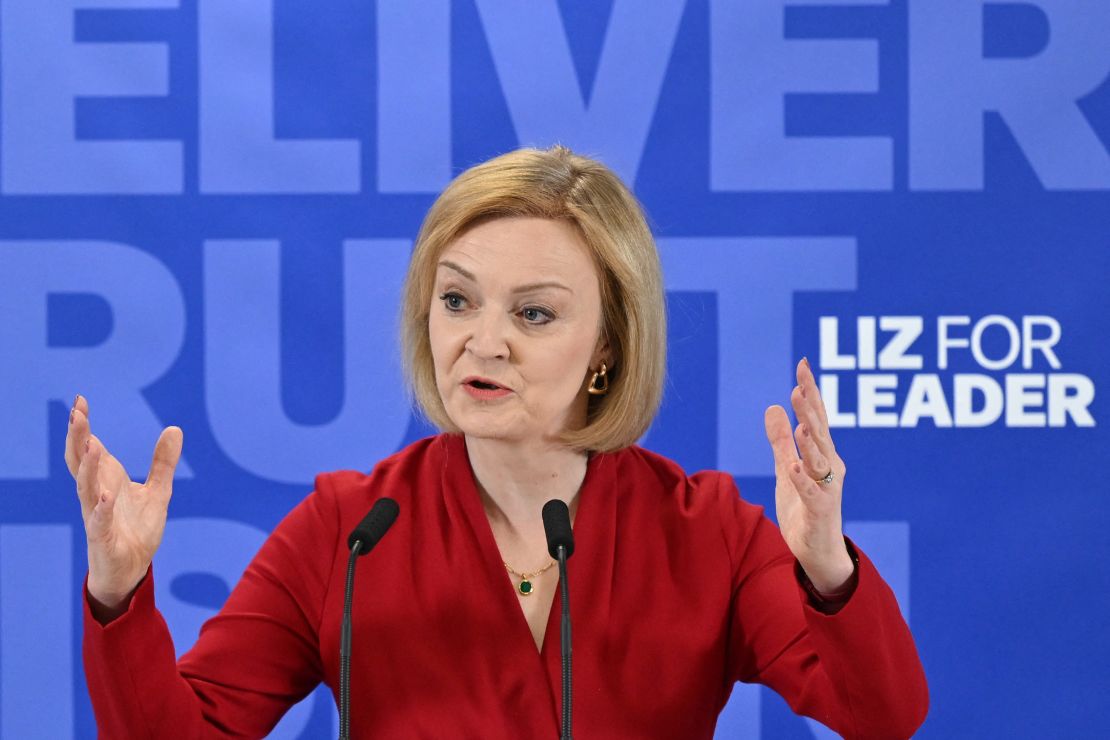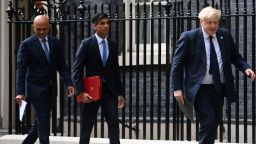Boris Johnson will be succeeded as prime minister of the United Kingdom by either Rishi Sunak or Liz Truss after the Conservative Party leadership race was on Wednesday narrowed down to the final two candidates.
Johnson resigned as party leader earlier this month after a series of scandals led to dozens of ministerial resignations. Ten Conservatives stood in the contest to replace him, and over five rounds of voting, members of parliament whittled those down to two.
Sunak won 137 votes and Truss got 113 votes in the final round, while Penny Mordaunt with 105 votes lost out.
Both of the final two candidates took to Twitter to comment on the result.
“Grateful that my colleagues have put their trust in me today. I will work night and day to deliver our message around the country,” tweeted Sunak.
For her part, Truss tweeted: “Thank you for putting your trust in me. I’m ready to hit the ground running from day one.”
Now about 160,000 rank-and-file members of the party will have their say, and in September the winner – and next prime minister – will be announced.
Both candidates who made it to the final two in the Conservative party leadership contest served in Johnson’s government, and could therefore be marred by the scandals that brought Johnson down.
The first was Johnson whipping his members of parliament to protect a political ally found to have breached lobbying rules, and ended with revelations that Johnson appointed as his deputy chief whip Chris Pincher, a man who’d been accused of sexual assault multiple times.
The best known scandal was “Partygate” in which Johnson and several political allies – including Sunak – were fined by police for breaching the government’s own Covid-19 restrictions. This made Johnson the first premier in history to be found guilty of having broken the law in office.
The task facing the final two candidates is enormous enough, with the UK suffering a cost-of-living crisis and the Conservative Party increasingly unpopular after 12 years in power. And as soon as the new leader takes over, the opposition Labour Party will be only too willing to remind whoever succeeds Johnson that they were part of that government.
On Wednesday, Johnson attended his final Prime Minister’s Questions session in the House of Commons. He boasted about his government’s response to the pandemic and his support of Ukraine in its defense against Russia.
“We’ve helped, I’ve helped, get this country through a pandemic and help save another country from barbarism. And frankly, that’s enough to be going on with. Mission largely accomplished,” Johnson said. “I want to thank everybody here and hasta la vista, baby.”

The final round of the leadership race took place amid a record-breaking heatwave, which sparked wildfires and highlighted the UK’s under-preparedness for the climate emergency as well as the need for urgent measures to curb carbon emissions.
Here is what you need to know about the two final candidates:

Rishi Sunak
Sunak has been considered the frontrunner for a long time. He served as Johnson’s Chancellor of the Exchequer (finance minister) from 2020 to 2022, and gained a largely positive public profile after introducing popular measures during the coronavirus pandemic, such as the furlough scheme and discounts on eating in restaurants.
He has recently come under pressure over questions regarding the tax status of his wife, Akshata Murthy, a multi-millionaire who is domiciled in India.
Some Conservatives were worried that Sunak found this level of scrutiny hard, and are concerned he would buckle under the pressure of being prime minister.
Despite this, he has consistently led the pack among Conservative MPs in the first rounds of voting.
Polling of Conservative members can be difficult, especially at such tumultuous times, but in those that have taken place Sunak has consistently come second to Truss among party members.
Even if he did make it to power, he would have to overcome criticism from political enemies of all stripes. Opposition leaders would be quick to remind Sunak that he was fined at the same Partygate event as Johnson.
They will also ask why Sunak remained loyal to Johnson for so long, only resigning after the scandal involving Johnson’s chief whip, Chris Pincher.
Things get worse when you factor in Johnson loyalists, who believe that Sunak’s resignation was the moment Johnson’s premiership began to crumble.
So, while Sunak might be the frontrunner, he will be surrounded by enemies on all sides.

Liz Truss
Truss also has a Johnson association problem. She is still serving as Johnson’s foreign secretary and will do so until he finally leaves office in September. She has stood by her leader throughout all of his scandals, justifying that fact she didn’t resign over the Pincher scandal because she was coordinating the UK’s response to Russia’s invasion of Ukraine.
That explanation might wash with some, however Truss is also largely thought of by Conservatives as the Johnson continuation candidate. Among her chief endorsers are some of Johnson’s most loyal allies, which could make dissociating herself from the current PM tricky.
It will also be tricky to distance herself from Johnson’s policies. Truss, who voted for the UK to remain in the European Union, has become an arch-Brexiteer since the 2016 referendum.
Since Johnson has taken office, she’s been his trade secretary and his foreign secretary. As the former, she has tub-thumped as loudly as Johnson over each and every trade deal signed, even ones that were simply rollover deals from the UK’s time in the EU.
She has also been an ardent supporter of Johnson’s plan to rewrite a controversial part of the Brexit deal, the Northern Ireland Protocol.
Truss has spent much of her time in high office building a power base and is very popular among both MPs and the Conservative grassroots.
Sunak and Truss will now spend the summer campaigning to Conservative grassroot members before the victor is announced by the party on September 5.
After that, Johnson will resign to the Queen, whom his successor will then visit and be invited to form a government.







